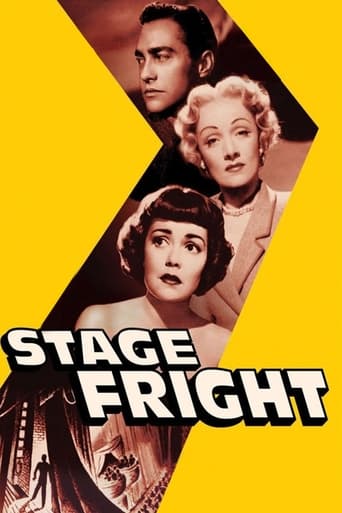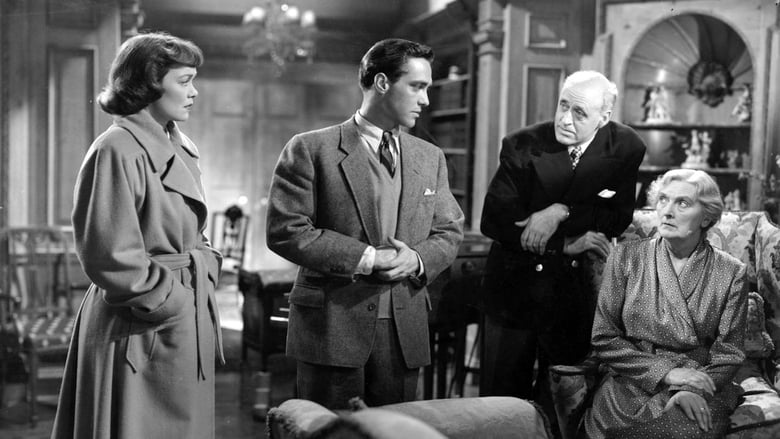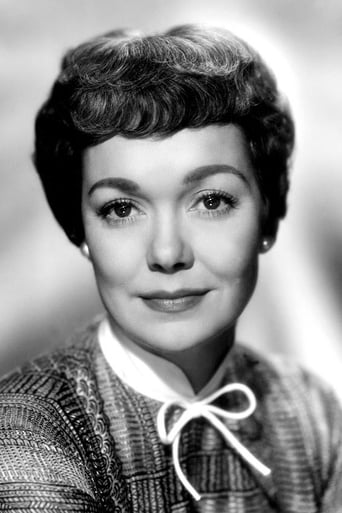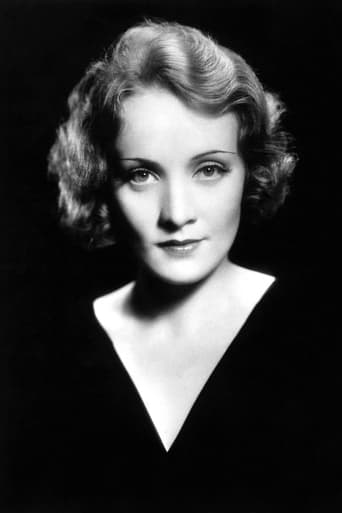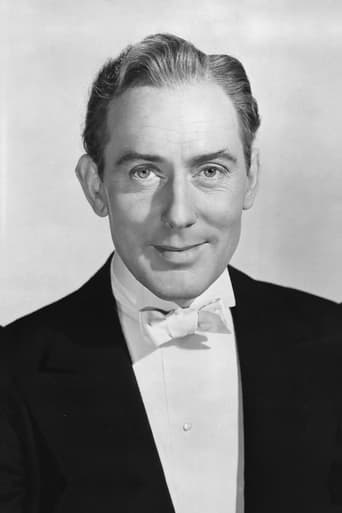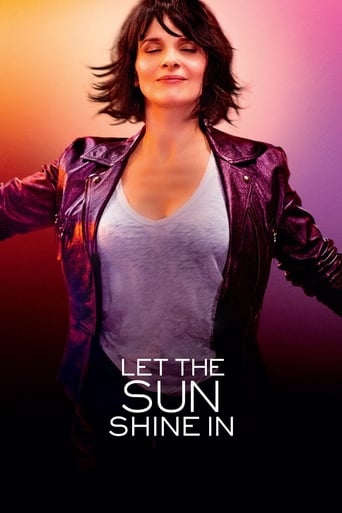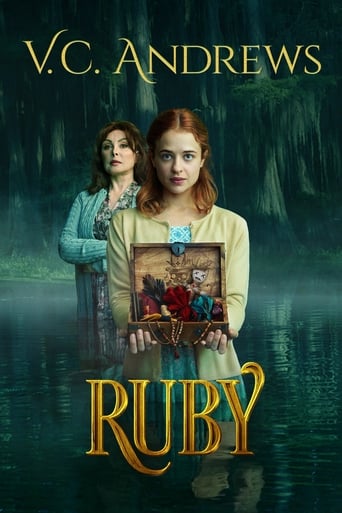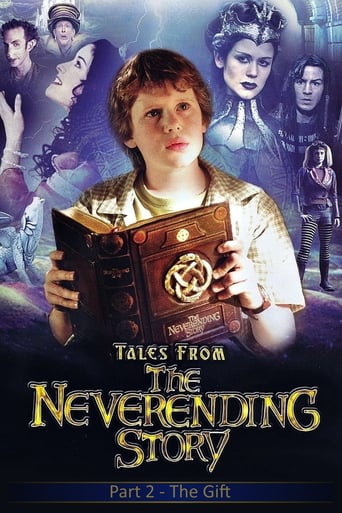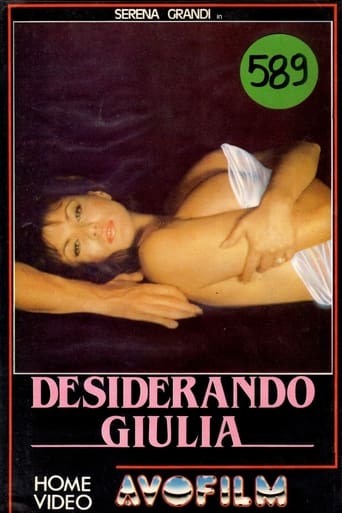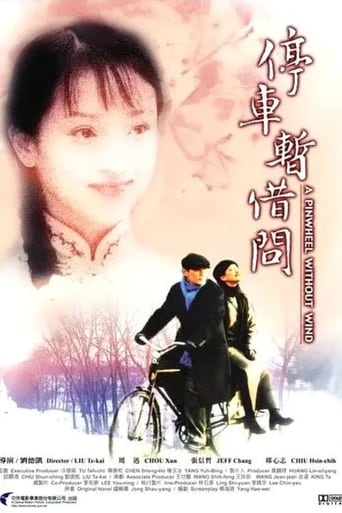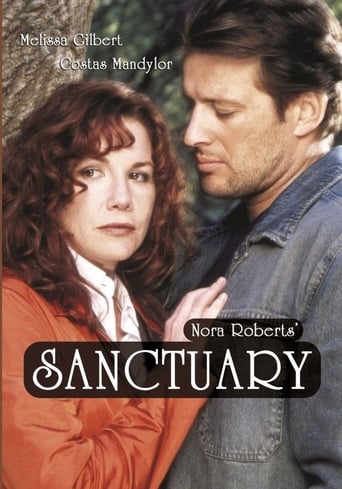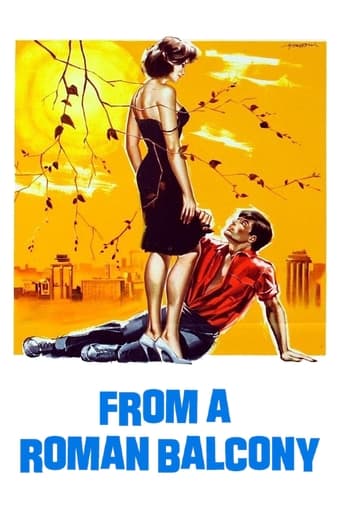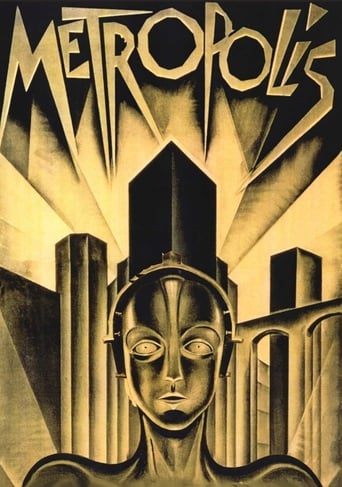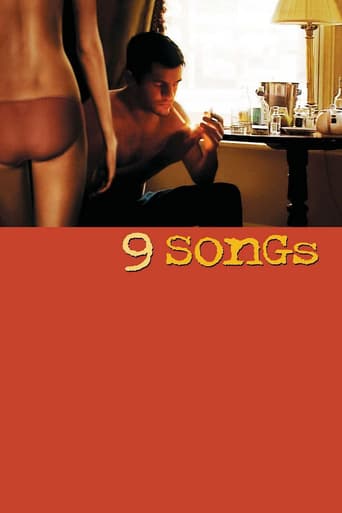Stage Fright (1950)
A struggling actress tries to help a friend prove his innocence when he's accused of murdering the husband of a high-society entertainer.
Watch Trailer
Cast


Similar titles
Reviews
Sick Product of a Sick System
Pretty good movie overall. First half was nothing special but it got better as it went along.
Fun premise, good actors, bad writing. This film seemed to have potential at the beginning but it quickly devolves into a trite action film. Ultimately it's very boring.
The thing I enjoyed most about the film is the fact that it doesn't shy away from being a super-sized-cliche;
Hitchcock returns to London with this nifty variation on the "wronged man" formula. Instead of the innocent man pursuing to clear his name, in this film it is a woman in love with him. Robinson (Richard Todd) goes to Eve (Jane Wyman), a theater understudy in training, about his being trouble with the law due to trying to help his lover, a renowned stage actress, Mrs. Inwood (Marlene Dietrich) cover up the murder of her abusive husband. So she convinces her father (Alistair Sim) to hide Robinson until she can prove his innocence. Deciding to "go undercover" as a lowly maid, Eve convinces Inwood's current maid, Nellie (Kay Walsh), to allow her a chance to substitute for her. But when Eve meets a detective inspector in a pub, Smith (Michael Wilding), her life will become increasingly complicated.Excellent casting (especially Sim) top to bottom, typically magnificent camera-work (elaborating in a voice that speaks volumes when characters don't talk), exceptional lighting (especially at the end when Eve and Robinson are in hiding while police look for them in an abandoned theater building), and twisty conclusion make for a real Hitchcock gem that deserves re-evaluation. It certainly turns the *wronged man* plot on its head with that ending. Dietrich gets to sing and raise her iconic eyebrows during scenes where her diva character is trying to worm her way out of uncomfortable situations which could condemn her. Todd's teetering from one emotional place to another at the end, showing us a completely different side to his character is good stuff. Hitchcock brings back the umbrellas momentarily during the Garden party sequence which has a neat scene with Sim involving a doll, using a child to deliver it to a mortified Dietrich on stage performing in a tent. Wyman's soft-spoken, sweet character, juggling so many circumstances at once (including a blossoming romance with "Ordinary" Smith), is the right kind of heroine for this kind of Hitchcockian comedy thriller. She is driven, loyal to a fault, and trustworthy: Robinson could go to her and Inwood could confide in her. Sim's fragile relations with his estranged wife is a hoot. The taxi scene where Eve realizes her love for Smith, and he can't hold back his for her is a delight. I'm not a fan of Dietrich's singing, but her scene with the bloody dress doll is masterful. She gets a wonderful monologue at the end, too, when she understands she's an accessory. Because Hitchcock has so many classics, really good ones like "Frenzy" or "Stage Fright" often get overlooked. I think it is time Stage Fright gets its chance. Wyman is the lead all the way, in almost every scene, but it is clear Dietrich is the Movie Star; I think you can tell with how they are cast, that Dietrich's status was highly respected in a showy part while Wyman's cherubic heart-of-gold character is overwhelmed in comparison when the two appear together in scenes. None the more is this apparent than at the end when Eve tries to get a confession from Inwood; timidity is bruised by ego, as Eve is overpowered by Inwood when the two discuss what *really* happened to her husband. Sim is a joy to watch every time he appears. Witty, clever, wise, spirited, and given the best dialogue, this character Sim wears with kid gloves.
With a friend being keen on watching a psychological Thriller,I decided to search around at a local CEX.Despite having heard about the "controversial" twist,I have somehow never got round to seeing Alfred Hitchcock's Stage Fright.Spotting the DVD being sold at a great price,I felt that it was the perfect time to step on to the stage.The plot:Whilst rehearsing a play at RADA,drama student Eve Gill is surprise to find her best friend (and secret crush) Jonathan Cooper visiting RADA,where he asks Gill if he can hide at her house.As she drives him to her home,Gill asks Cooper what he is running away from.Cooper reveals that he went to cover his secret lover Charlotte Inwood murder of her husband, (which led to Inwood's dress being covered in blood,an item which Cooper has gotten hold of)but got spotted by Inwood's dresser Nellie Goode,who reported Cooper to the cops for murder.Introducing Cooper to her dad,Gill's father notices that the blood on Inwood's dress appear to have been deliberately smeared on it.Suspecting that Inwood has set Cooper up,Gill & her dad decide to confront Cooper with their suspicions,who shows his approval for their idea,by throwing the blood stained dress on a fire.Losing the biggest piece of evidence,Gill decides that the only way she can now prove Cooper's innocence is to go undercover and find out about what Inwood does once the curtain goes down.As she starts gathering info on Inwood,Gill begins to discover that murder is not a dress rehearsal.View on the film:Despite Hitchcock saying that the (still) controversial twist in Whitfield Cook/Alma Reville/James Bridie & Ranald MacDougall adaptation of Selwyn Jepson novel Man Running was his "Second biggest film mistake" the twist actually sums up the themes in the film in a perfect manner.With mistrust being right at the centre,from Gill trying to keep her real motives hidden from Inwood,to Gill's dad suspecting the Cooper is not giving the full story on the blood stained dress.Going against the grain of Hitchcock's traditional "man on the run",the writers instead push all the guys to the side lines,in order to make this a gripping women on the run,as Gill's attempts to keep her true motive hidden from Inwood leads to Gill having to take increasingly desperate measures,in order to keep both sides of her life separate from each other.Making sure that the movie does not solely rely on its sting,the writers build a superb menacing Film Noir atmosphere,which creeps across the screen as Gill's desire for the facts to change tightens its grip.Perfectly setting the mood by raising the curtain on London,Hitchcock & cinematographer Wilkie Cooper push the viewer into the fractured psychological issues facing the characters with dazzlingly low-lit,tightly held shots,which allow the viewer to witness the moment when the "truth" tears Gill apart and leaves Cooper's image completely shattered. Emphasizing the dark uneasy mood,Hitchcock covers the film in ultra-stylised tracking shots,which along with revealing the dark corners of the stage that Cooper & Gill hide in,also subtly expose Gill's belief that she and Cooper are both on the same track.Lighting up the title the moment she steps on stage,the alluring Marlene Dietrich gives an excellent performance that hits a perfect mix of Femme Fatale & upper-crust Diva.Along with reaching the high notes in the movies catchy songs,Dietrich keeps Inwood pouring with slick charisma,which leads to Inwood showing no weaknesses,when Gill confronts her with the "truth".Going in the other direction to Dietrich,a pretty Jane Wyman gives a great performance as Gill,thanks to Wyman giving Gill a strong determination over clearing Cooper's name,which Wyman gradually shows to crumble,as Gill uncovers the real events behind the murder.Joining the girls, Alastair Sim gives a performance flowing with charm as Gill's nervous dad,whilst Richard Todd shows Cooper's calm manner to be a hollow shell,which shatters as he exits,stage death.
There is a recurring plot in crime dramas: an innocent man is suspected of committing a murder, and he tries to evade the police long enough to prove his own innocence. Hitchcock often used it, as in "The 39 Steps." This plot requires us to suspend disbelief, because no one has ever proved his innocence in real life by avoiding the police long enough to find out who really did it and getting evidence to prove it. "Stage Fright" is a slight variation on this plot. In this case, the suspect's friend tries to hide him from the police long enough to prove the murder was committed by someone else. Once again, no one in real life has ever managed to do that.In a really good movie, like "The 39 Steps," suspending disbelief is easy, and we are well rewarded for doing so. But in a mediocre film like "Stage Fright," we are only partially engaged in the movie, and thus find ourselves comparing what happens with reality, and being a little put off by the difference. Instead of suspending disbelief, we find ourselves simply disbelieving.Maybe it is just me, but if I were suspected of a crime I did not commit, I would get myself a lawyer and turn myself in to the police. The movie begins with Jonathan telling Eve that Charlotte came over to his apartment with blood on her dress, saying she killed her husband in self-defense during an argument. He says he agreed to help her establish an alibi, and he goes back to her place to get another dress, and while he is there, tries to make it look like a burglary. However, Charlotte's maid shows up, sees him, and is able to identify him to the police. Now, we later find out that this story is a lie. But while I was watching it, taking this story seriously, I thought to myself that I would have simply advised Charlotte to get a lawyer and turn herself in to the police. And if she refused, I would have notified the police anyway.Furthermore, when Jonathan shows up at the theater where Eve, an actress, is in rehearsal, he tells her that the police want him for something he didn't do, and she agrees to help him escape. She should have told Jonathan to get a lawyer and turn himself in to the police. If he refused to do so, she should have notified the police herself.She takes Jonathan to her father's place, where the father agrees to help Eve hide Jonathan. By this time, it will come as no surprise when I say that if I had been Eve's father, I would have told Jonathan to get a lawyer and turn himself in to the police. If Jonathan and Eve refused to go along with this idea, I would have notified the police anyway.Later, we find out that it was Jonathan who killed Charlotte's husband. But that only allows for one more iteration of my general advice. In that case, Charlotte should have gotten a lawyer and gone to the police. Even if she did instigate the murder, as Jonathan claims, she could have denied involvement, and Jonathan would have been the one to go to prison.Now, it might be argued that if any one of these characters had gone to the police, as I say they should have, there would have been no movie. But any movie that is lackluster enough to allow for disbelief, rather than the suspension thereof, is a movie we would have been better off without.
For an Alfred Hitchcock thriller released in 1950, "Stage Fright" seems strangely behind the times. Afterall, "Shadow of a Doubt" was released in 1943, "Rope" a fear years later and "Strangers on a Train" a year after "Stage Fright". These are all incredibly "modern" pictures. "Stage Fright", in contrast, plays like one of Hitchcock's 1930s thrillers, lacking the sophistication of much of his 1940s work. At the same time, were it released by any other director, "Fright" would perhaps be fairly highly regarded. It's just, with Hitchcock, one places higher standards.The plot? The incomparable Marlene Dietrich plays Charlotte Inwood, a stage actress who rules London's theatre houses. Being a cold hearted wench, she frames actor Jonathan Cooper (Richard Todd) for the murder of her husband and then watches with delight as poor Cooper falls headlong into another one of Hitchcock's Kafkaesque "wrong man" plots. Assisting Cooper is Eve Gill (Jane Wyman), a spunky young actress who attempts to prove Cooper's innocence. Resilent and cunning, she ensnares Charlotte in a trap of her own. Sounds like Hitchcock's "Spellbound"? Yes, it's virtually the same film.Unsurprisingly, "Stage Fright" is preoccupied with stages, acting, false identities and performances. All the main characters are actors, and Eve frequently poses as invented characters in order to learn information, get into barred locations or bribe others. The film's first three acts are likewise structured around a series of lies (virtually everything said is dishonest), whilst the film's climax involves a series of truthful revelations, though again these are staged as actorly performances. As far as I know, this was also the first film to use a now well-worm cliché; it's the old gag in which the villain is tricked into revealing or confessing his or her crimes in front of an audience he or she is unaware is present ("Minority Report", "Monster's Inc" etc etc).The film marked Hitchcock's return to England after a series of pictures in America. It contains one riveting, suspenseful set piece, and continues Hitchcock's trend of favouring strong female roles. The rest of the film is well shot, but its script will undoubtedly seem generic and well-worn to modern audiences.7.9/10 – Worth one viewing.

